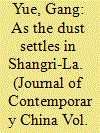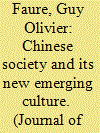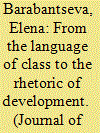|
|
|
Sort Order |
|
|
|
Items / Page
|
|
|
|
|
|
|
| Srl | Item |
| 1 |
ID:
082730


|
|
|
|
|
| Publication |
2008.
|
| Summary/Abstract |
With the English translation of his novel Red Poppies published in 2000, the ethnic Tibetan author Alai has established a prominent presence outside the People's Republic, apart from the Shangri-La myth that has dominated the Western imagination of Tibet. This essay attempts to unpack the multitudes of meaning of the novel, situate it against a material history of opium in Eastern Tibet, and highlight the dilemma of a leading Tibetan author. Through further discussion of his essays unavailable in English, this essay aims at developing a cultural geography of Alai's intellectual travel, energized by a Tibetan warrior tradition in his homeland and yet detailed about contemporary social, cultural, and environmental changes. It paints a picture about a Tibet that is neither a paradise nor a human hell, alive in the moment to survive the creative destruction of Sino-globalization that began long before the People's Liberation Army marched into Lhasa
|
|
|
|
|
|
|
|
|
|
|
|
|
|
|
|
| 2 |
ID:
082725


|
|
|
|
|
| Publication |
2008.
|
| Summary/Abstract |
China has gone through major changes during the last two decades. The following research aims to present and analyze the current evolutions taking place in the less visible stratum of the Chinese social structure, that of values. The study is based on in-depth interviews and brings to the fore a number of themes that have undergone radical changes. Among the 220 analytical categories initially considered, 12 main themes have been identified as being strongly subjected to changes. Focusing on significant themes, such as a growing process of 'individuation', a materialistic orientation, a resurgence of ancient creeds, changes within the family, a shift in women's status, a transformation of role models, a social change from equality to differentiation, and a shift in the vision of the world, this article presents key indicators of the major trends in contemporary urban China
|
|
|
|
|
|
|
|
|
|
|
|
|
|
|
|
| 3 |
ID:
082722


|
|
|
|
|
| Publication |
2008.
|
| Summary/Abstract |
recent years the concept of 'soft power', popularized by the work of Joseph Nye, has gained currency in both China and Taiwan. This paper explores how the Chinese and Taiwanese understand soft power and its sources, and how their understanding differs from Nye's formulation. It discusses why this foreign concept has become so salient in the Chinese and the Taiwanese discourse. It also examines the impact of this concept on the external policies of China and Taiwan. The paper concludes by pointing out the limitations of the concept of soft power.
|
|
|
|
|
|
|
|
|
|
|
|
|
|
|
|
| 4 |
ID:
082720


|
|
|
|
|
| Publication |
2008.
|
| Summary/Abstract |
This article examines the sources of Chinese foreign policy in a particularly important case-recent policy toward North Korea. It surveys that policy in several areas: the economic backdrop, leading the six party talks, permissive support for United Nations Security Council measures, signals-some rhetorical, others more tangible-warning against future transgressions, and some coercive measures that impose costs on North Korea today. In sum, it finds Beijing has wielded a number of coercive tools aimed a North Korea, while avoiding excesses that might lead to spirals on the peninsula or regionally. Defensive realism best explains this policy, both in the aggregate and in detail in many cases. Offensive realism, strategic culture, and bureaucratic politics approaches do a particularly poor job of explaining outcomes in what shozuld be for each of them a relatively easy case. This has important implications for understanding the sources of Chinese foreign policy in other areas. Further, on North Korea policy, while it is important for American policy makers to recognize that Beijing is not working fundamentally at cross-purposes to Washington's own goals, it is also important to recognize that Beijing has mixed motives
|
|
|
|
|
|
|
|
|
|
|
|
|
|
|
|
| 5 |
ID:
082731


|
|
|
|
|
| Publication |
2008.
|
| Summary/Abstract |
In the People's Republic of China's (PRC) continuous state-building project since its establishment in 1949, the notion of nation and nationality (minzu) has been uninterruptedly utilised by the leading elite in its political programmes. The notion of the 'nationality question' (minzu wenti) was employed especially for addressing the issues of the officially identified minority nationalities at the time when the multinational nature of the state was made fundamental. However, how a multinational character of the Chinese state is interpreted by the state elite and how this interpretation is shaped by their policies have arguably changed along with the political and economic preferences of the regime. This paper aims to explore the meaning of 'nationality question' during the period of socialist construction, and traces the shift in its notion during the reform period which started in the 1970s. The essay pays attention to the change in the preferred corresponding English term of minzu wenti. I argue that the substitution of the 'nationality question' term, which was dominant during the socialist period, with the concept of the 'ethnic question' during the reform period points not only to the changing character of the government policies towards minorities, but also legitimises them as the only suitable and rightful in the context of economic reforms.
|
|
|
|
|
|
|
|
|
|
|
|
|
|
|
|
| 6 |
ID:
082729


|
|
|
|
|
| Publication |
2008.
|
| Summary/Abstract |
This essay re-examines new realism in documentary film and photography in China. Distinct from official realism, genuine realism requires that experience be seen within its real environment and characters and actions of a realist work be shaped by that environment. This principle challenges the visual regime of spectacle controlled by the expanding global cultural industry. Documentary realism represents a penetrating social comment but also recovers a materialist understanding of workers' life and conditions in China. Photo-realism on the other hand uncovers the forgotten ways of life among ordinary people in the fast modernization of the cities.
|
|
|
|
|
|
|
|
|
|
|
|
|
|
|
|
| 7 |
ID:
082724


|
|
|
|
|
| Publication |
2008.
|
| Summary/Abstract |
China's progress in fixing its banking system has surprised observers. Successful experiments, some of them involving foreign investors, have emerged in China to deal with the problems of the banking system. The International Finance Corporation (IFC), the private sector arm of the World Bank Group, has played an active role in piloting some of these approaches in close cooperation with the regulator and other strategic investors. In the period 1995-2000, IFC's strategy was to work with one or two banks to help improve their governance and skills. The idea was to create some model banks which could be emulated by others and used by the regulators to introduce modern banking practices. Once the corporate governance and business practices of these banks improved, then the IFC was able to attract foreign banks to invest in these banks. These investments encouraged other foreign banks to consider taking minority stakes in the smaller banks. The success of these experiments gave confidence to the Chinese authorities to open up the big state-owned banks for foreign investment and encouraged big international banks to invest large sums of money to take minority stakes in the big banks. While progress in reform has been remarkable, the real and sustainable transformation of the Chinese banks is far from over and will be a lengthy process. Significant challenges such as improving corporate governance and credit risk management remain. Despite the significant opening of the banking system to foreign direct investment, foreign ownership in the Chinese banking system remains low by international standards. Even with existing limitations on foreign ownership, foreign strategic investors are contributing to the transformation of Chinese banks and their role remains highly relevant for the continued reform of the Chinese banking system
|
|
|
|
|
|
|
|
|
|
|
|
|
|
|
|
|
|
|
|
|